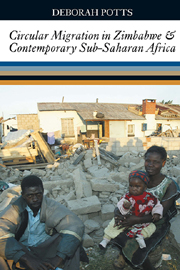Book contents
- Frontmatter
- Contents
- List of Maps, Figures, Tables, Boxes & Photographs
- List of Abbreviations
- Preface
- 1 Introduction
- 2 Regional Paradigms & Approaches to Circular Migration
- 3 Regional Paradigms & Approaches to Circular Migration
- 4 Harare & Zimbabwe
- 5 Migrant Livelihoods & Migration Trajectories in Harare
- 6 Harare Migrants' Rural Links & Assets
- 7 Variations in Migrants' Experience, Perceptions & Options
- 8 Social & CulturalAttachments to Rural Settings & Homes
- 9 Attacking the Urban Poor & Abusing Rural Links Operation Murambatsvina 2005
- 10 Conclusion
- Appendix: Consumer Price Index (all items) for Urban Families 1973–2007
- Bibliography
- Index
4 - Harare & Zimbabwe
From Formal City to Outsourced Urban Livelihoods
Published online by Cambridge University Press: 05 July 2013
- Frontmatter
- Contents
- List of Maps, Figures, Tables, Boxes & Photographs
- List of Abbreviations
- Preface
- 1 Introduction
- 2 Regional Paradigms & Approaches to Circular Migration
- 3 Regional Paradigms & Approaches to Circular Migration
- 4 Harare & Zimbabwe
- 5 Migrant Livelihoods & Migration Trajectories in Harare
- 6 Harare Migrants' Rural Links & Assets
- 7 Variations in Migrants' Experience, Perceptions & Options
- 8 Social & CulturalAttachments to Rural Settings & Homes
- 9 Attacking the Urban Poor & Abusing Rural Links Operation Murambatsvina 2005
- 10 Conclusion
- Appendix: Consumer Price Index (all items) for Urban Families 1973–2007
- Bibliography
- Index
Summary
In 1985, when the research upon which this book is based began, one pound was worth Z$1.6. At the end of July 2008, when writing this chapter, on the parallel market a pound was valued at one thousand trillion of the original Zimbabwean dollars. This extraordinary comparison provides perhaps the best introduction to the dramatic economic changes which are the backdrop to this chapter. It describes the national and urban contexts within which internal migration and urban livelihoods in Zimbabwe have developed since the country's independence in 1980.
From the 1980s to 1997, Zimbabwe passed through two economic policy phases. Although the timing was different, they broadly mirrored the post-colonial experience of other sub-Saharan African countries. In the decade 1980–90, the government pursued the general aims of modernization theory, assuming a central role in the economy and investing heavily in health and education. Economic sectors deemed key to the economy, such as commercial agriculture and manufacturing industry, continued to be encouraged by various policies, as they had under the colonial Rhodesian governments but so also were formerly, seriously disadvantaged sectors in which most citizens gained their livelihoods, particularly peasant agriculture. Import barriers operated to protect industries from external competition and there were foreign exchange controls.
- Type
- Chapter
- Information
- Publisher: Boydell & BrewerPrint publication year: 2010



